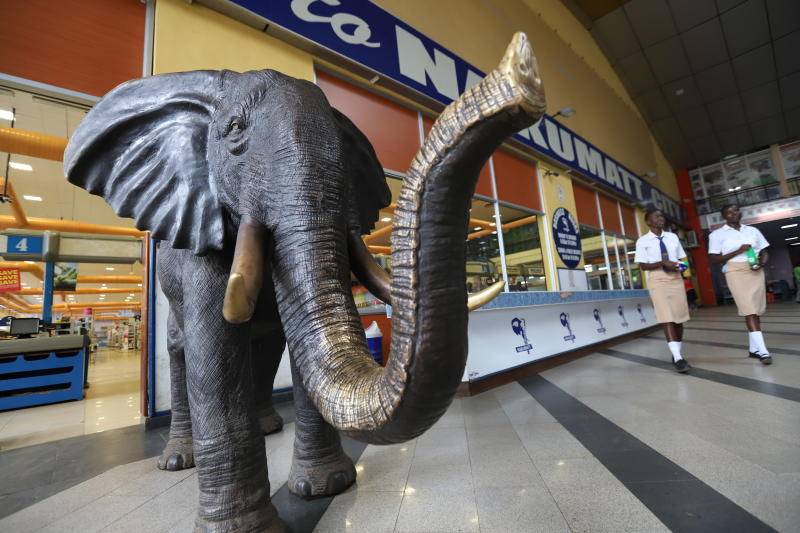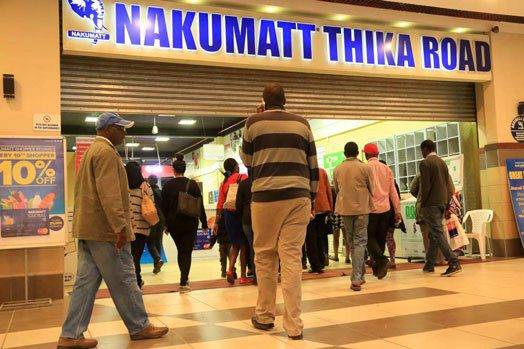30 Years In Making And Less Than 3 Years In Breaking: What Pushed This Retail Giant Into A Bottomless Pit

I have always been a ‘shopaholic’ and have fond memories of the fun I had going shopping with my mother during my childhood days. Being that she always preferred to shop at Nakumatt, we would always go there every time we went shopping. We’d travel for an hour and half to Eldoret, and that’s where we’d meet our favorite Nakumatt store.
Once ‘The Darling’ Of East Africa
I always felt a palpable sense of excitement entering the Nakumatt building. People from different parts thronged the place. While some came to do their household shopping, others bought products to resell in their local shops.
I remember how well-stocked the shelves were, and how the aisles were laid out in neatly-arranged rows. Even though I rarely did any actual shopping for myself, I loved to walk around and fist my eyes on the well-displayed merchandise as my mother picked items from the shelves.
Weekends and school holidays proved to be the busiest times to go shopping at Nakumatt. Owing to the large numbers of people – all of them struggling to pick and drop in the shopping basket – you could smell the dank sweat of warm bodies, some pushing ahead in the crowded passageway. At the payment counter, one was greeted by long, snaking queues as he/she emerged from the aisles and approached to make payment.
Shoppers would later come out with arms burdened with multiple shopping bags. From an aerial view, you could see a pool of blue and white merchandise, a signage widely associated with the Nakumatt brand.
Nakumatt’s food court was the favorite spot for many of its loyal shoppers. On weekends, long queues usually formed around the area and that made the walkways narrow, forcing people to move in straight lines like soldiers in battlefield formation. Successful shoppers skillfully found their way out the place by locating tiny crevices and minute gaps between people and squeezing through.
The Glory Days
During its heydays, Nakumatt was not only a darling to shoppers but also to property owners. Newly malls erected in choice locations were battling amongst themselves to have the retailer as their anchor tenant. NextGen Mall, located along Mombasa Road, opted to offer Nakumatt its space even though Naivas had bid for the area and was almost guaranteed of the same.
The supermarket chain had developed into a giant in the retail sector of East Africa. It had also established a formidable online presence. Interestingly, to date, the supermarket chain still boasts the highest number of social media followers when compared to its competitors.
As at the time of putting this piece together, Nakumatt still has 292,488 followers on its Facebook page, 119,000 followers on its Twitter platform, and over 10,000 followers on Instagram. And in some way, those yet make for somewhat impressive numbers given that the rosy days now seem to be largely over.
Owing to their strong online presence, Nakumatt did score some laurels for its efforts during those good times. It took home the 2015 Social Media Awards (SOMA); an award by Safaricom that honors companies and individuals for their growing influence by and through their social media platforms.
Nakumatt Holdings also received an ISO 9001:2008 Certificate from the Kenya Bureau of Standards (KEBS) after the successful three-year implementation of ISO 9001:2000. The retailer was recognized after meeting ISO 9001:2008 standards for its quality management systems. The firm was first awarded an ISO 9001:2000 certification in February 2007 after a successful audit.
Nakumatt surpassed retail-branding expectations leading to the renewal of the Super brand Certification. The retail front also received an accolade from neighboring Rwanda for being “Best Taxpayer.”
During its peak, Nakumatt climbed up to 25th position in Planet Retail’s global list of 2006. This award saw Nakumatt Holdings become the first East African retail chain to break into this prestigious ranking.
Also worthy of mention is the fact that Nakumatt’s customer service was described by many as the best there is during those glory days. Unlike many of its peers, the veteran retailer had a smart team which was always on hand to attend to customer needs. Popular opinion has it that there was always a friendly face and a polite voice responding to individuals who were making various enquiries.
Nakumatt was essentially the name on everyone’s lips during those glory days. Because of the combination of factors making up its strongest points – some of which include; the pocket-friendly products on its shelves, the aesthetic appeal stemming from the layout of its stores which supports convenient shopping, as well as its efficient customer service, the retailer was basically the toast of all and sundry.
The Fall From Grace
As affluent multinationals with highly-developed supply-chains opened stores at high-end locations in Nairobi, Nakumatt began to crumble under the weight of its inefficiencies.
Today, the once undisputed giant in the retail space is struggling to keep the lights on and get back on its feet in the wake of a wretched phase that saw it suffer huge losses and served numerous lawsuits for debt amounting to a staggering USD 359.47 Mn.
At its peak, the fallen giant could lay claim to over 60 stores spread across Kenya, Uganda, Tanzania and Rwanda. It had over 5,500 employees on its payroll and its gross annual revenue hovered around USD 700 Mn.
Unlike its competitors, the retailer could boast of a huge loyal base of customers during the good old days who always thronged its shopping outlets to do their household shopping.
But given the current situation, all that would now seem like a relic of a distant past. Some would say Nakumatt was enjoying a pleasant existence in dreamland and has now awoken to a nightmare in reality.
The 30-year-old supermarket chain fell down the trench and got sucked into the mire within approximately 600 shambolic days. And even though some of the more obvious failings could be blamed on bad fate and a series of grave misfortunes that couldn’t have exactly been helped or mitigated, the company’s management does shoulder some of the blame for shooting itself on the foot on more than one occasion.
Tragedy, Incompetence, Attitude: Less Than 3 Years Of Spiraling Downwards
The quick, gruesome downfall has been attributed to various factors, including incompetent management. The drastic liquidity and meltdown have also been blamed on poorly-executed expansion plan based on a debt-funded acquisition spree.

Source: businessdailyafrica.com
Nakumatt’s woes began in late 2016, when the management of the retail chain made public its cash flow problems. As time went by, the situation only got worse. Nakumatt continued to suffer losses due to gross mismanagement. By mid-2017, their state was forlorn – Brobdingnagian had turned Lilliputian.
By this time, shoppers who walked through the doors of most Nakumatt shopping outlets were slapped with rows of empty shelves, sullen-faced staff and only a handful of customers. The tantalising smell of freshly-baked snacks was was now gone. The buzzing, humming sound of the microwave was no longer heard.
Eventually, the once ‘traffic-laden’ aisles, and pathways usually clustered by a sea of bodies, were now wide and devoid of shoppers. It was a strange, and perhaps, a painful sight to behold, especially for Nakumatt’s loyalists.
Customers were discouraged by the constant disappointment of bare shelves, and the retail chain lost them by their hundreds. The embarrassing situation even prompted some section of shoppers to scorn the retailer’s famous tag line; “you need it, we’ve got it” soon became: “you need it, we don’t have it.”
Former employees and investors of Nakumatt portray the scenario of a firm whose management capacity did not keep up with its enormous growth.
“It’s a tragedy that needn’t have happened,” said Andrew Dixon, who was hired to revamp management.
Dixon who spoke to Reuters after the fall divulged that a dastardly attack by the terrorist group, Al-Shabaab, and an unfortunate fire incident in one of its stores catalysed the downfall of the supermarket brand.
The former giant retailer was put under administration after incurring a cumulative debt amounting to USD 359.47 Mn which it owed to its creditors. Numerous suits have since been filed against Nakumatt by its creditors who are demanding the liquidation of the business as a way of settling the debts owed. Court cases are known to have dragged on for several months, and even now, many more are still in the docket.
Nakumatt’s Creditors Out For Blood
The retailer had challenges paying its rent in various outlets which saw a group of close to 20 landlords head to court to sue the company over rent arrears amounting to USD 6 Mn.
A combination of bad fate and some terrible misfortune catapulted the downfall of the once ‘darling’ chain store. A fatal fire in one store, the demolition of another, and the 2013 attack by militant religious extremists on their flagship store at Westgate Mall contributed to the fall of Nakumatt. The attack by the terrorist group saw the supermarket lose no less than USD 43 Mn.
And They Blew Up Chances To Get Back Up
Though fate served up another chance – Tuskys; another retail giant attempted to salvage the ailing Nakuru-born supermarket – but the deal never quite materialised.
The efforts failed to yield any kind of fruit as there were lots of disagreements within Tuskys’ ranks. They had planned to acquire a 51 percent stake in the troubled store, but the board members never came to a head.
Nakumatt had another shot at trying to prevent further losses. The idea was to provide a recovery platform. The retail brand restructured its model by cutting down on operating cost. In the new strategy, there were plans to close several of its poorly performing branches in Kenya and Uganda, and then opening new mega stores at carefully-selected, high-traffic locations.
In the end, the strategy again flopped as the damage that had already been done proved just too much to fix for even the new strategy.
Intervention by the Kenyan government later came in when a second petition seeking to have Nakumatt Holdings Ltd declared insolvent over USD 600K in unpaid dues was talked up. This was in the wake of an ill-fated agreement the retailer reached with Gold Crown Beverages for the supply of tea leaves.
The manufacturer had opted to go to court following continuous unfruitful efforts to have the debt paid. Because of this, the government held talks with bank representatives in a move to rescue the supermarket chain that was staring down the liquidation barrel.
Who Else Has Taken The Hit?
The wobbling and eventual fall of a retailer that was once thought of as untouchable depict the harsh realities of the East African retail sector. And Nakumatt is not the only big name that has been submerged in financial turmoil – Uchumi, Ukwala, and Ebrahim also collapsed under similar circumstances.
Uchumi was bedeviled by stock-outs, rental arrears, and delayed salary payments. And this forced the company to exit the Ugandan and Tanzanian market in 2015 after years of recording losses. To date, it is yet to settle millions of dollars still owed to suppliers.
Both Ukwala and Ebrahim were popular family-owned stores. Ukwala has been applied for liquidation by 300 suppliers claiming arrears of almost USD 10 Mn. The chain store had a number of branches across Kenya but those have since been renounced and the retail front is now owned by Botswana retailer, Choppies, which purchased a 75 percent stake.
For Ebrahim, it’s more like total defeat as the pioneer retailer has since closed its last remaining outlet in Nairobi after operating in Kenya for 75 years.
Their Loss, Others’ Gain
Following Nakumatt’s downfall, Tuskys has taken over as the biggest indigenous chain store in Kenya with almost 60 stores. Naivas is providing stiff competition in second place with up to 50 stores spread across different towns.
The fall of Nakumatt may have also come as a blessing in disguise for global retailers like Carrefour, Choppies, and Souq, who are all starting to take up strong positions in the market. These multinationals have all seized the opportunity to expand their markets and sell their brand.
But despite the efforts of these international brands, the local retailers still have a firm grip on the Kenyan market. According to an investment advisory firm, Cytonn, it was revealed that “locally-owned retailers account for more than 85 percent of supermarket sales and still command a loyal following, particularly among consumers below the very top of the income pyramid.”
Although it’s hard to see the brand going anywhere near its former position as market leader, Nakumatt seems to be making some sort of comeback. Though hardly a renaissance, it is currently on the road to recovery with a new model centered around the development of seven key branches – Nakumatt Mega, Prestige, Ukay, Lavington, Embakasi, Mega City (Kisumu), and Nakumatt Nakuru.
Will This Journey Be Beautiful Again?
Cytonn Investment reports that in 2018, the retail sector in Kenya improved with average rental yields by 0.3 percent; an increment to 8.6 percent from the 8.3 percent recorded in 2017.
“The improved performance has been attributed to the recovery of the market from the tough economic environment in 2017 characterised by prolonged electioneering and reduced private sector credit growth to 4.3 percent as at June 2018 from a five-year average of 14.0 percent,” a part of the Cytonn report reads.
In accordance with Kenya’s 2030 vision medium-term plan 2013-2017, the retail sector is among the six key sectors estimated to make up the most substantial part of Kenya’s Gross Domestic Product (GDP). It has also been projected to create approximately 50 percent of total formal employment.
Such figures would suggest a promising future for Kenya’s retail sector in general, and perhaps some respite for Nakumatt in the coming years. The brand might yet survive the storm in the long run, but there is a feeling that ship may have taken too much of a battering to get anywhere close to being once again considered the mother ship.
